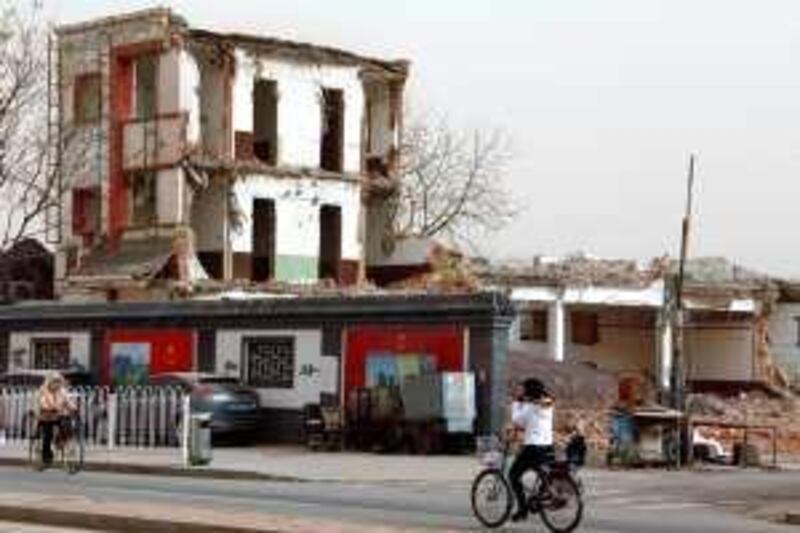China has received plaudits for its efforts to overcome the global economic crisis. The US$586 billion (Dh2.15 trillion) government stimulus spending package encouraged rapid economic expansion as other major economies contemplate sluggish growth and burdensome levels of treasury debt.
But, according to Victor Shih, a professor of political science at Northwestern University in the US and the author of Factions and Finance in China: Elite Conflict and Inflation, the financial picture in the world's most populous nation is not what it appears. Prof Shih believes trillions of yuan of debt accumulated by local investment companies (LICs), set up by local governments to finance stimulus projects outside of their main balance sheets, will lead to vast numbers of loans not being repaid, forcing a central government bailout of the banking sector. He adds that when, to repay their debts, local authorities sell off the mainly residential land put up as collateral against the money they borrowed, millions will be forced from their homes.
"I am not saying there will be a financial crisis if many of these companies go under, but it will be a costly process of restructuring the banks," says Prof Shih, who outlined his views in a talk in Beijing last week. He says there are as many as 8,000 LICs and they have been set up in a "highly untransparent way", partly to minimise the apparent debt-to-GDP ratio. Local governments in China run "perennial deficits", since most taxation revenue streams go directly to the central government. Therefore, to finance stimulus spending, which include infrastructure upgrades but also extends to the likes of property and hotel projects, they have been forced, via the LICs, to turn to banks.
According to Prof Shih's analysis, the LICs have accumulated an estimated 11.4 trillion yuan (Dh6.13tn) of debt so far, against an officially acknowledged figure of 6tn yuan. Exact totals are hard to come by, but Prof Shih says unless the central government forces a retrenchment in LIC borrowing, the LICs will accumulate a further 12.7tn yuan in debt by the end of next year. To put this into perspective, current LIC debt equates to 33.3 per cent of China's GDP last year of 34.2tn yuan. Future debt is equivalent to a further 37.3 per cent. This means the total debt racked up by LICs could reach 70.7 per cent of the country's GDP figure for last year. Using GDP growth projections, the LIC debt will be 58.4 per cent of next year's GDP (estimated at 41.1tn yuan) - or seven times local government income.
"Most likely the local debt will exceed the size of China's foreign exchange reserves," Prof Shih says. "It's not nearly as bad as Japan, but not as sanguine as the official figure, which is one of the lowest in the world," he says. As a result, the country's banks are facing an insolvency risk, which will require a "massive bailout". "The debt is collateralised against land, so to repay it they will have to sell the land - millions and millions of hectares," he says. "This is what local governments all over China will have to do, whether [current debt is] 6tn yuan or 11tn. They will have to force tens of millions of residents from their land, sell the land and repay the debt. We're seeing this already on a large scale but the scale will be more intense than in the past few years."
The eviction of people from their homes, sometimes accompanied by physical intimidation and with compensation that residents have often branded inadequate, has become a major concern in China and has received considerable coverage in the country's press. Local governments will, Prof Shih says, be forced to sell land just to repay interest. About a quarter of the debt will end up as non-performing loans (NPLs), he expects, with the problems greatest in poorer parts of China where local governments have modest cash flows. Local governments in cities such as Beijing and Shanghai will have fewer problems, but even they will have to "bulldoze hundreds of kilometres of land". However, Prof Shih thinks China's current leaders will try to smooth over the problem of NPLs until 2012, when a new coterie takes the helm, which is likely to mean an increase in inflation.
"The central government should take over the bank debt of all the county local investment entities because they have the least ability to repay the debt," he says. "For the others - they will become NPLs, but in [better off] cities. Let the banks deal with them themselves by selling the NPLs into the market. There are foreign investors interested in buying them." While saying much of the blame for land seizures will be laid at the door of local governments, Prof Shih believes discontent could filter up to the central authority. But not everyone agrees with his forecast.
Ren Xianfang, a China analyst at IHS Global Insight, believes the LICs will not take on as much further debt as Prof Shih predicts. The central government, she says, has already started to control the LICs' debts by introducing auditing and instructing banks to restrict lending. "It's quite unlikely for future local government debt to get to this kind of size. It's just too big," she says. She also believes the selling off of land can be postponed "indefinitely", or at least until the new administration takes control in 2012. Additionally, the social consequences of relocations could be modest, Ms Ren says, as many urban residents in particular are "quite happy" to be compensated with "lots of money" for properties.
"They can make millions overnight," she says, adding that in rural areas, too, people are often keen to be paid off and relocated. @Email:dbardsley@thenational.ae






